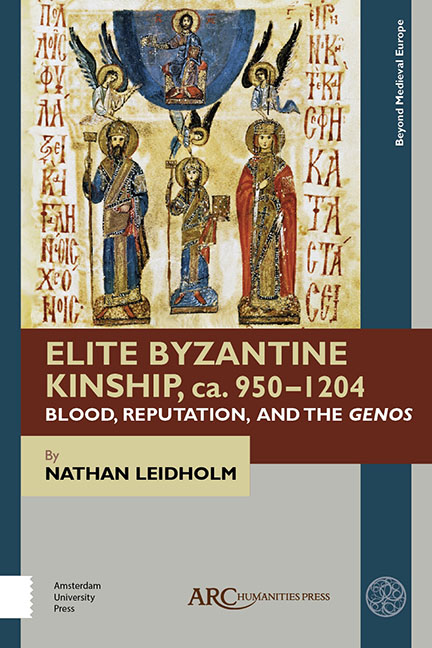Book contents
- Fronrtmatter
- Contents
- List of Abbreviations
- Abbreviation
- Acknowledgements
- Introduction
- Chapter 1 Defining “the Family” in Byzantine Sources and the Modern Historiography
- Chapter 2 The Language of Kinship
- Chapter 3 Marriage Impediments and the Concept of Family
- Chapter 4 Interrogating Consanguinity in a Byzantine Context
- Chapter 5 Family Names and the Politics of Reputation
- Chapter 6 Kinship and Political Developments of the Eleventh and Twelfth Centuries
- Conclusion
- Select Bibliography
- Index
Chapter 6 - Kinship and Political Developments of the Eleventh and Twelfth Centuries
Published online by Cambridge University Press: 20 November 2020
- Fronrtmatter
- Contents
- List of Abbreviations
- Abbreviation
- Acknowledgements
- Introduction
- Chapter 1 Defining “the Family” in Byzantine Sources and the Modern Historiography
- Chapter 2 The Language of Kinship
- Chapter 3 Marriage Impediments and the Concept of Family
- Chapter 4 Interrogating Consanguinity in a Byzantine Context
- Chapter 5 Family Names and the Politics of Reputation
- Chapter 6 Kinship and Political Developments of the Eleventh and Twelfth Centuries
- Conclusion
- Select Bibliography
- Index
Summary
Ἐγὼ δὲ οὐκ ἂν ψϵύσαιμι τὰς πρὸς ἐκϵῖνον συνθήκας ἀƛƛ’ϵὐμϵνὴς καὶ φιƛάνθ ρωπος ἔσομαι, πατήρ τϵ τοῖς νέοις καὶ τοῖς ἥƛιζιν ἀδϵƛφὸς καὶ βακτηρία τοῖς γέρουσι καὶ παῖς τῇ διαθέσϵι καὶ μιμήσϵι τῆς φύσϵως.
I will not prove false in my contract with him [God], but will be kind and compassionate, a father to the young, a brother to those my age, a cane to the elderly and like a son to them in disposition and in imitation of nature.
Words spoken by Emperor Constantine X Doukas upon taking the throneTHE DEVELOPMENT OF the aristocratic genos in the eleventh and twelfth centuries was intimately connected with contemporary politics, especially at the highest level. The influence of emperors or empresses was felt primarily in two ways. First, elite families in Byzantium were never completely independent from imperial influence. Throughout the period covered here (and beyond), imperial office and title, alongside the support of the imperial throne, continued to play a decisive role in determining the fortunes of aristocratic families. The Byzantine aristocracy remained an aristocracy of imperial office-holders. Second, the changing of imperial dynasties and the nature of imperial legitimization had a tangible effect on the rest of the Byzantine aristocracy. After the end of the Macedonian dynasty in 1056, emperors were forced to find alternative methods of legitimizing their rule. One method was through the “nobility” or “illustriousness” of their family lines, a fact that reverberated throughout the rest of high society. The period between 1056 and 1081 was one of instability in imperial politics, but it was simultaneously a time of heightened concern among the elite regarding family cohesion and identity. The dynasty founded by Alexios I Komnenos in 1081 would in turn harness this development within the imperial government itself, morphing the genos into a centripetal, rather than a centrifugal force.
The imperial government has predictably remained a central focus in modern scholarship. As Michael Angold argues, contradictory assessments of the eleventh and twelfth centuries typically hinge upon the “effectiveness of the state.” For Ostrogorsky, the weakening of the central government at the expense of the growth of power and influence of “feudal lords” caused the empire's decline over eleventh century.
- Type
- Chapter
- Information
- Elite Byzantine Kinship, ca. 950–1204Blood, Reputation, and the Genos, pp. 137 - 162Publisher: Amsterdam University PressPrint publication year: 2019

